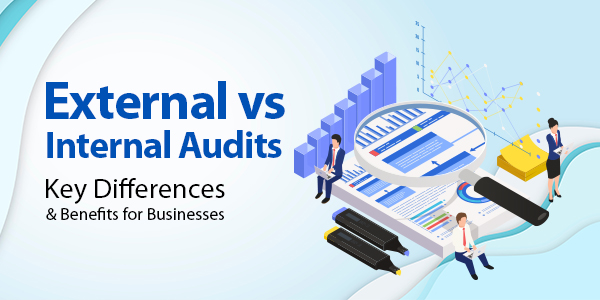External vs. Internal Audits: Key Differences and Benefits for Businesses
Every business, regardless of size or industry, benefits from regular audits. But there are two main types of audits, and understanding the key differences between them is crucial for ensuring a company’s overall health. This blog post will delve into the world of internal and external audits, explaining what sets them apart and the advantages they offer businesses, especially those seeking comprehensive Audit and Assurance Services in Kochi.
Who Conducts the Audit?
The most fundamental difference lies in the independence of the auditors. Internal audits are conducted by employees of the company itself, forming an internal audit department. External audits, on the other hand, are performed by independent accounting firms that have no prior connection to the business being audited.
What’s the Purpose?
Internal audits serve a more proactive role. Their primary objective is to assess a company’s internal controls, risk management processes, and operational efficiency. By identifying weaknesses and inefficiencies, internal audits aim to improve the organization’s overall performance.
External audits, however, focus on providing assurance to external stakeholders. Their primary purpose is to verify the accuracy and fairness of a company’s financial statements. This independent verification builds trust with investors, lenders, and other external parties who rely on the financial health of the business.
Scope of the Audit
Internal audits typically have a narrower scope compared to external audits. They can be tailored to focus on specific departments, processes, or areas of potential risk within the organization. Internal auditors might examine IT security protocols in one audit and procurement practices in another.
External audits, on the other hand, have a broader scope. They delve into a company’s entire financial reporting system, including revenue recognition, expense management, and asset valuation. The goal is to ensure compliance with relevant accounting standards and regulations.
Frequency of Audits
Internal audits are generally conducted more frequently than external audits. Companies may have a team of internal auditors who conduct ongoing reviews throughout the year, focusing on different areas as needed.
External audits typically occur annually, following the end of a company’s fiscal year. However, depending on the industry and regulatory requirements, some businesses may require more frequent external audits.
Benefits of Internal Audits
Improved Operational Efficiency: By identifying weaknesses in processes and controls, internal audits can help streamline operations and reduce waste.
Enhanced Risk Management: Internal audits can proactively identify and mitigate potential risks before they escalate into bigger problems.
Better Decision-Making: Internal audits provide valuable insights that can inform strategic decision-making across the organization.
Preparation for External Audits: A strong internal audit function can pave the way for a smoother external audit by identifying and addressing potential issues beforehand.
Benefits of External Audits
Increased Credibility: An independent audit opinion from a reputable firm bolsters a company’s credibility and builds trust with external stakeholders.
Compliance Assurance: External audits verify compliance with relevant accounting standards and regulations, reducing the risk of legal or financial penalties.
Improved Access to Capital: A clean audit report is often a prerequisite for securing loans or attracting investors.
Peace of Mind: External audits provide peace of mind to management and shareholders by ensuring the financial health of the organization is accurately reflected.
Internal and external audits are complementary practices that offer distinct benefits to businesses. By implementing both types of audits, companies can gain valuable insights into their internal operations and financial health, ultimately promoting stronger governance, improved performance, and increased stakeholder confidence. If you’re looking for professional audit services, consider partnering with a reputable Auditing Firm in Kochi to ensure thorough and accurate assessments.
 English
English






